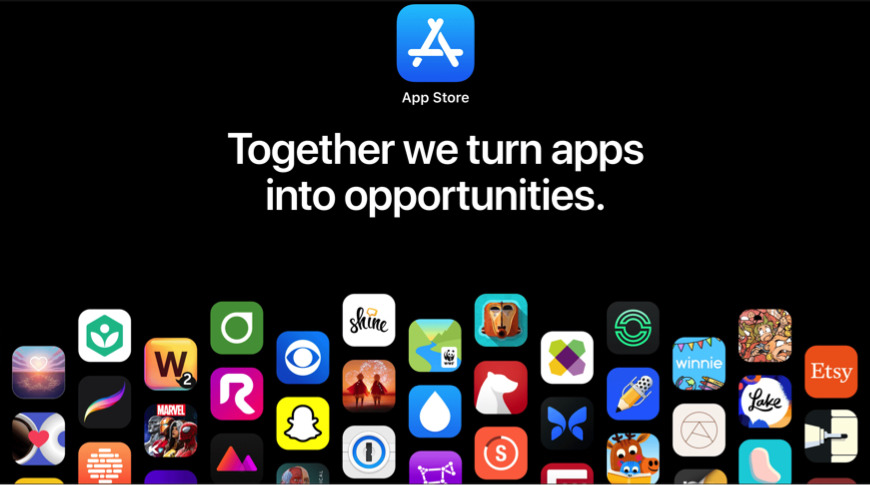The UK's anti-competition authority is opening up an investigation of continued allegations that Apple uses its App Store to restrict competition, and set "unfair terms" for developers.
Adding to the increasing number of international anti-trust investigations against Apple, the UK's Competition and Markets Authority (CMA) says it is to examine the App Store. The CMA says it follows an unspecified number of complaints sent to it.
"Millions of us use apps every day to check the weather, play a game or order a takeaway," Dr. Andrea Coscelli, chief executive of the CMA, said in an official government statement.
"So complaints that Apple is using its market position to set terms which are unfair or may restrict competition and choice - potentially causing customers to lose out when buying and using apps - warrant careful scrutiny," he continued.
In response, Apple told BBC News that it plans to cooperate with the CMA over the investigation.
"We believe in thriving and competitive markets where any great idea can flourish," a spokesperson said. "The App Store has been an engine of success for app developers, in part because of the rigorous standards we have in place - applied fairly and equally to all developers - to protect customers from malware and to prevent rampant data collection without their consent."
"We look forward to working with the UK Competition and Markets Authority to explain how our guidelines for privacy, security and content have made the App Store a trusted marketplace for both consumers and developers," concluded the Apple spokesperson.
The CMA says that the investigation is only just beginning, "and no decision has yet been made on whether Apple is breaking the law." It also says that it intends to cooperate with the European Commission, which it notes opened four antitrust probes into Apple, before the UK's Brexit transition period ended.
International investigations into App Store all center on the issues of how much Apple charges developers, and how it requires them to use its own in-app payment systems. The most high-profile dispute regarding both of these issues is the ongoing battle between Apple and "Fortnite" developer Epic Games.
Separately, the UK's Competition and Markets Authority is considering a complaint filed by the Which? consumer watchdog. That organization is requesting an investigation into Qualcomm's allegedly anti-competitive pricing, that Which? believes resulted in inflated iPhone prices.
 William Gallagher
William Gallagher

-m.jpg)






 Marko Zivkovic
Marko Zivkovic
 Mike Wuerthele
Mike Wuerthele
 Christine McKee
Christine McKee
 Amber Neely
Amber Neely
 Wesley Hilliard
Wesley Hilliard












75 Comments
This is very good. Apple seems to have gained the attention of a lot of official legal bodies around the globe wishing to investigate them on competitive behaviour recently. Which they are obliged to do so if official complaints are made and seem genuine.
Poor choice of words IMO:
"
Especially when part of the investigation revolves around the competition aspect.
Nothing in Apple's response tackled the root issue. It can't, because Apple doesn't allow for competition at a store level.
Given the circumstances I think they would be better off not saying anything publicly.
There is very little chance that Apple will win all of these investigations and be able to continue as usual. Chances are some investigations will result in changes having to be made, so there will be different rules in different localities. That will be a bit of a headache for all involved, especially developers. Unless Apple applies the lowest common denominator to all App stores, but I imagine that very unlikely under Cook.
Apple is and always has been a hardware company, the software (App Store, iOS etc) was supposed to be to push device sales, but Cook has realised it can be used to milk more money from iOS, and is apparently happy risking Apple's reputation to bump the bottom line slightly higher.
It would be so easy for Apple to allow notarised sideloading and all this would go away, with a popup explaining to the user that security can be breached much more easily without going through the App Store. The notarised apps could be disabled if they are malicious, but without having to comply with onerous App Store rules. It's already done with enterprise certificates as it is, but "official" sideloading would make the user aware of the risks. Apple doesn't guarantee every app on the App Store isn't fraudulent anyway, so users should be careful as it is.
Of course people here and elsewhere will claim that sideloading will infest iOS with malware, but macOS has been "open" for years, and it is not infested with malware. The inability to sideload on iOS is purely about profit and control.